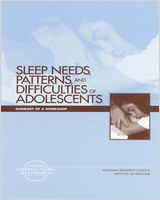NCBI Bookshelf. A service of the National Library of Medicine, National Institutes of Health.
Sleep is not only a biological necessity but also a physiological drive. In today's fast-paced world, though, a good night's sleep is often the first thing to go. The effects of inadequate sleep are more than mere annoyances: they affect our mood and how we perform at school, work, and home and behind the wheel. Lost sleep also accumulates over time; the more "sleep debt " an individual incurs, the greater the negative consequences, according to researchers in the field.
Research on adolescents and sleep has been under way for more than two decades, and there is growing evidence that adolescents are developmentally vulnerable to sleep difficulties. To discuss current research in this area and its implications in the policy, public, health, and educational arenas, the Forum on Adolescence of the Board on Children, Youth, and Families held a workshop, entitled Sleep Needs, Patterns, and Difficulties of Adolescents, on September 22, 1999.
Contents
- THE NATIONAL ACADEMIES
- FORUM ON ADOLESCENCE 1999-2000
- BOARD ON CHILDREN, YOUTH, AND FAMILIES 1999-2000
- Preface
- INTRODUCTION
- ADOLESCENT DEVELOPMENT AND SLEEP
- ADOLESCENT SLEEP PATTERNS AND DAYTIME SLEEPINESS
- CONSEQUENCES OF INSUFFICIENT SLEEP
- IDENTIFYING AND INTERVENING IN CLINICAL SLEEP PROBLEMS
- CHANGING SCHOOL STARTING TIMES
- EDUCATING THE PUBLIC ABOUT ADOLESCENT SLEEP NEEDS
- NEXT STEPS
- References
- OTHER INFORMATION RESOURCES
- Appendix Workshop Agenda and Participants
- Selected Reports of the Board on Children, Youth, and Families
Suggested citation:
National Research Council and Institute of Medicine (2000) Sleep Needs, Patterns, and Difficulties of Adolescents. Forum on Adolescence. Mary G. Graham, ed. Board on Children, Youth, and Families, Commission on Behavioral and Social Sciences and Education. Washington, D.C.: National Academy Press.
NOTICE: The project that is the subject of this report was approved by the Governing Board of the National Research Council, whose members are drawn from the councils of the National Academy of Sciences, the National Academy of Engineering, and the Institute of Medicine. The members of the committee responsible for the report were chosen for their special competences and with regard for appropriate balance.
The study was supported by Grant No. 2925-003 between the National Academy of Sciences and Carnegie Corporation of New York and Grant No. 5294-158 between the National Academy of Sciences and the National Institute on Child Health and Human Development, U.S. Department of Health and Human Services. Any opinions, findings, conclusions, or recommendations expressed in this publication are those of the author(s) and do not necessarily reflect the views of the organizations or agencies that provided support for this project.
- NLM CatalogRelated NLM Catalog Entries
- Family pediatrics: report of the Task Force on the Family.[Pediatrics. 2003]Family pediatrics: report of the Task Force on the Family.Schor EL, American Academy of Pediatrics Task Force on the Family. Pediatrics. 2003 Jun; 111(6 Pt 2):1541-71.
- Middle school start times: the importance of a good night's sleep for young adolescents.[Behav Sleep Med. 2007]Middle school start times: the importance of a good night's sleep for young adolescents.Wolfson AR, Spaulding NL, Dandrow C, Baroni EM. Behav Sleep Med. 2007; 5(3):194-209.
- Facilitators and Barriers for a Good Night's Sleep Among Adolescents.[Front Neurosci. 2020]Facilitators and Barriers for a Good Night's Sleep Among Adolescents.Hedin G, Norell-Clarke A, Hagell P, Tønnesen H, Westergren A, Garmy P. Front Neurosci. 2020; 14:92. Epub 2020 Feb 7.
- Review The nurse's role in promoting a good night's sleep for patients.[Br J Nurs. 2007]Review The nurse's role in promoting a good night's sleep for patients.Pellatt GC. Br J Nurs. 2007 May 24-Jun 13; 16(10):602-5.
- Review The sleep needs of adolescents.[J Sch Nurs. 1999]Review The sleep needs of adolescents.Kelman BB. J Sch Nurs. 1999 Aug; 15(3):14-9.
- Sleep Needs, Patterns, and Difficulties of AdolescentsSleep Needs, Patterns, and Difficulties of Adolescents
Your browsing activity is empty.
Activity recording is turned off.
See more...
